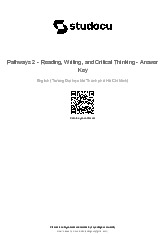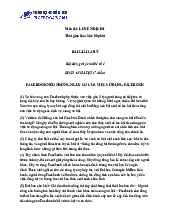





Preview text:
lOMoAR cPSD| 45315597 lOMoAR cPSD| 45315597
Outline for speaking test
Unit 1: Management/Administration
- Top/senior/successful/unmatched/distinguished manager
- Accomplish/attain/fullfil/meet/achieve targets/goals/purposes/objectives
- Set targets/ goals/purposes/objectives
- Attain sth: nỗ lực để đạt được điều gì đó
- Young colleagues/subordinates - Owners/shareholders
- Make a maximum profit
- Execute/ carry out plans and strategies/precise tactics
- Manage a business’s relation with customers, suppliers, distributors, bankers,
investors, neighbouring communities, public authorities: cơ quan công quyền
- Public sector institutions and services: các tổ chức và dịch vụ công
- Business enterprises= companies
- Not-for-profit organisation: TC phi lợi nhuận
- Integrate oneself into sth: hoà nhập bản thân vào…
- Integrate sth with sth: hợp nhất cái gì với cái gì
- Unconventional/innovative people
- Distinct work/activities: riêng biệt, khác nhau
- Educate/ train/teach/instruct sth to sb: Unit review:
1. What is a manager?
Manager is an individual who is in charge of a certain group off tasks, or a certain area
or department of a business. Moreover, they are very crucial for an organization, who is
liable for carrying out 4 functions of management including planning, organizing, leading, controlling,
2. What can a manager do with the subordinates when cosidering their performance, and behaviors?
Besides managers need to allocate human resources effectively, and delegate appropriate
tasks to them, they also try to measure and evaluate the work of all subordinates to ensure
that they are on target. During this time, juniors are supported, trainned and given adviced
by managers to get done with work. What is more, the header could reward people for
doing a good job and taking corrective action if they are not, when considering their performance.
3. What is a leader?
Leader is an individual who doesn’t hold a management position. A person can become a
leader without a formal title because the basis of leadership is on the personal qualities pf
the leader. Different from managers, they have followers who volutarily follow he/she. lOMoAR cPSD| 45315597
The leader also embrace their own unique leadership qualities and act with independently
accountable passion. And they inspire and motivate their teams to maintain long-term
progress and excitement toward achieving their goals.
4. Why is it possible for anyone to become a leader?
Anyone can become a leader without a formal title because the basis of leadership is on
the personal qualities pf the leader. Different from managers, they have followers who
volutarily follow he/she. The leader also embrace their own unique leadership qualities
and act with independently accountable passion. And they inspire and motivate their
teams to maintain long-term progress and excitement toward achieving their goals.
5. How is a manager different form a leader? A manager A leader
- Have a formal title: a management - Without formal title, anyone can be a position,
and need to have sufficient leader otherwise they embrace unique
qualifications to become a manager. leardership qualities: passion,
- Have the subordinates that need to inspiration,...
follow the mangers without reasons ( do
- Have followers that voluntarily follow
not have choice but to listen to the
the directions of a leader. Those who no
demands and wishes of the seniors)
longer wish to follow the leader will
because of his/her job description and simply stop title.
- Have the authority and power to hire,
promote, discipline and fire employees
- Have no formal, tangible power over
based on their performance and
their followers. It is awared to the behaviours.
leader on a temporary basis and is
contingent upon the leader’s ability to
continue to motivate and inspire followship.
6. What are the five common roles of a manager? Explain them briefly.
A manager in an organisation is responsible for carrying out the 5 roles of management. Planning:
- Setting aims or targets that is also the sense of organisational direction and purpose. It’s
a poor manager who does not plan for the future at all.
- In addition, a manager must also plan for the resources which will be needed (eg: have
strategies to help the companies achieve aims set for it) Organizing: lOMoAR cPSD| 45315597
- allocate/organize people and resources effectively( delegate appropriate tasks to others
and make sure that they are capable of carrying out it successfully)
- organize people and resources carefully indeed, make sure that specialization(chuyên
môn hoá) occurs and two people don’t end up doing the same task.( = perform overlapping tasks) Coordinating:
- make sure that all departments in the organisation work together to achieve the plans
originally set by the manager. Commanding:
- Make sure all supervisors and workers are keeping to targets and deadlines. Instructions
and guidance must be provided by managers and it is also their responsibility to make
sure that the tasks are carried out by people below them in organisation. Controlling:
- measure and evaluate the work of all individuals and groups to make sure that they are on target.
- develop people by giving them instructions and advice to increase their level of productivity
- the header could reward people for doing a good job and taking corrective action if they
are not, when considering their performance.
- find out the root problems of the issues and correct them.
7. What makes a good manager?
- “A good manager is not a person who can do the work better than his men; he is a
person who can get his men to do the work better than he can.” – Frederick W. Smith
Excellent managers are quite rare because this position requires a lot of skills regarding to
management. To become a unmatched manager, you should carry out 5 functions successfully.
A company’s top managers also have to consider the future, and modify or change the
organization’s objectives when necessary, and introduce the innovations that will allow
the business to continue. Top managers also have to manage a business’s relations with
customers, suppliers, distributors, bankers, investors, neighbouring communities, public
authorities, and so on, as well as deal with any crisis that arises. lOMoAR cPSD| 45315597
Unit 2: Work and motivation
Theory X- Theory Y of Douglas McGregor
He criticizes the Theory Y cz there are many people who are not looking for
responsibility and achievement at work. They are individuals fulled with self-
discipline, who need security and certainty and protection agaainst the burden of responsibility.
- Applicable to sth: thích hợp với cái gì - Be far more ….
- Make a difference in sth: tạo ra sự khác biệt trong cái gì
- Realize their own potential: nhận ra tiềm năng của mình
- Would rather do something/ would prefer to do something:
- People are motivated by fear of losing their job
- People-centred(adj): lấy con người làm trung tâm
- Incentive(n) TO/ motivate/encourage/inspire sb to do sth
- Advertise for sth/jobs: quảng cáo để tìm người/bán j đó Case 1: a. Financial benefits
Non- financial benefits - salary increase
- job rotation a challenging job not
- good remuration like bonuses, perks,
boring, repetive and mechanical job tips, commision,..
- giving them some resposibilities, not as
- paid holiday/trainning programs
individuals but as part of a team. - job insurance - corporate culture - the posibility of promotion - good labour relations - job security
From my perspectives, job rotation is the best method for the store manager to
employ because each of the sales staff has certain tasks and they only do one
assignment, that makes them very boring, discouraged. They cannot seek the
enjoyment and job satisfaction of these tasks, but just want to give up them. So
the manager should encourage job rotation, as doing 4 different repetive jobs a
day is better than doing only one.
b. Job rotation is the best method for the store manager to employ because each of the
sales staff has certain tasks and they only do one assignment, that makes them very
boring, discouraged. They cannot seek the enjoyment and job satisfaction of these lOMoAR cPSD| 45315597
tasks, but just want to give up them. So the manager should encourage job rotation, as
doing 4 different repetive jobs a day is better than doing only one. c. Theory X - financial Theory Y management Non- financial management
Is contingent upon the characteristic
- Is contingent upon the characteristic of theory of theory Case 2: a. Two factors will be: - poor working condition
- autocratic and conservative manager: not be friendly and bring people together or listen
to them in order to create a hamorious atmosphere for the employees. From that, it also
improve the level of productivity. b. 8% ()
c. No, I don’t think so. Because you can see the salary received in Factory A is higher
than others. The other factors like poor working condition and autocratic and conservative
manager: not be friendly and bring people together or listen to them in order to create a
hamorious atmosphere for the employees. From that, it also improve the level of
productivity will abosultely cause the poor motivation at A
d. According to Herzberg’s theory,( hygiene needs/factors & motivation needs/factors
satisfiers & motivators)
the manager can employ giving them a challenging and interesting job, recognition and
responsibility, promotion, job rotation, corporate culure….
But under this conditions, the FF manager can :
- change the corporate culture, the relation between the employers and employees.
- Introduce some reward, bonuses, perks,….
- Giving them some responsibilty not as an individual but as a part of team motivators
- Upgrape the working condition ( hygiene factor) lOMoAR cPSD| 45315597




